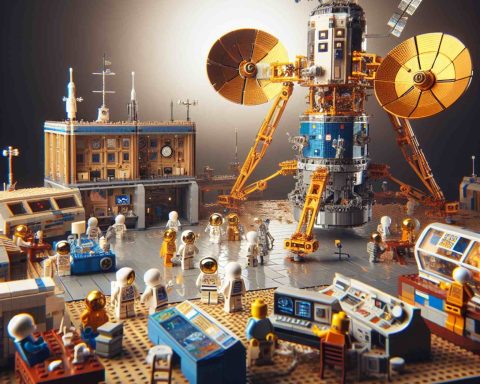- Pakistan forms a historic partnership with China’s CMSA, allowing Pakistani astronauts to partake in missions to the Chinese Space Station, Tiangong.
- Two Pakistani astronauts will train at the Astronaut Center of China to become key contributors to space research and exploration.
- Scheduled for 2026, these astronauts will conduct groundbreaking experiments in microgravity and ecological monitoring.
- The research aims to advance medical, environmental, and space technologies, impacting fields here on Earth.
- Prime Minister Shehbaz Sharif celebrates this as a defining moment in Pakistan’s space journey.
- CMSA Director General Dr. Lin Xiqiang highlights the mission’s importance in fostering a peaceful space exploration partnership.
- Suparco Chairman Mohammad Yousuf Khan calls upon the youth to participate in advancing Pakistan’s role in global space endeavors.
Under the vibrant canopy of an invigorating partnership, Pakistan embarks on an uncharted journey into the cosmos. In a captivating event that captured imaginations, Prime Minister Shehbaz Sharif witnessed a monumental agreement: the alliance between Pakistan’s Space & Upper Atmosphere Research Commission (Suparco) and the China Manned Space Agency (CMSA). This pact paves the path for Pakistani astronauts to journey to the Chinese Space Station, Tiangong.
As the ink dries on this unprecedented contract, two courageous souls from Pakistan gear up to become celestial trailblazers. They will train at the Astronaut Center of China, honing their skills to navigate the heavens. One among them will assume the crucial role of a scientific payload specialist, poised to delve into groundbreaking research across domains like microgravity studies, ecological monitoring, and beyond.
By 2026, Pakistan aims to have these pioneers ready to take flight, with the China Space Station serving as their laboratory beyond Earth’s grasp. As they conduct pioneering experiments, expect revelations that could reshape the frontiers of medical research, redefine environmental analyses, and propel space technology to new heights. The ripple effects promise tangible benefits right here on Earth, in fields spanning from health to technology.
Shehbaz Sharif lauded this chapter as a defining juncture in Pakistan’s space journey—a testament to the nation’s resolve to carve its spacefaring destiny. His words resonated with the echo of aspiration and determination, underscoring past triumphs and anticipating future victories in the domain of space science.
The excitement doesn’t end there. CMSA Director General Dr. Lin Xiqiang underscored this mission as a testament to the intertwined destinies of two nations united by an unwavering commitment to peaceful space exploration. This alliance, he suggests, becomes a beacon of shared knowledge and a symbol of cooperation in the cosmic theatre.
Chairman of Suparco, Mohammad Yousuf Khan, urged the youth and the nation’s brightest minds to converge in this celestial pursuit. The message is clear: the sky is merely the start. By fostering innovation and skill development, Pakistan positions itself as a pivotal player on the global space stage.
Flying towards the stars, these Pakistani pioneers are not just advancing through space; they are laying a foundation. They inspire, they innovate, and above all, they show that with persistence, even the cosmic wonders can bend to human curiosity and ambition.
Pakistan’s Entry Into Space: New Horizons and Future Prospects
Introduction
Pakistan’s recent collaboration with the China Manned Space Agency marks a significant milestone in its space exploration efforts. With a mission set to feature its first astronauts aboard the Chinese Space Station, Tiangong, by 2026, this partnership is set to transform the country’s space capabilities. Here, we delve deeper into the implications, opportunities, and challenges of this ambitious journey.
Learning to Navigate Space: Training and Roles
– Training at Astronaut Center of China: The selected Pakistani astronauts will receive extensive training in China, emphasizing both space travel and scientific research skills. This partnership facilitates technology transfer, enhances scientific expertise, and strengthens bilateral ties.
– Role of Scientific Payload Specialist: One of the astronauts will focus on conducting cutting-edge research in microgravity, ecological monitoring, and more. This role is crucial for exploring scientific phenomena that are impossible to replicate on Earth.
Industry Trends and Economic Impact
– Space-Tech Innovation: The partnership is expected to spur innovation in telecommunications, environmental monitoring, and defense. It could lead to advancements in satellite technology and space engineering within Pakistan.
– Economic Benefits: By joining the spacefaring nations, Pakistan positions itself for economic benefits, including boosting STEM education, creating high-tech jobs, and attracting international collaborations and investments.
Challenges and Considerations
– Technological Dependence: Relying on another nation’s infrastructure poses challenges. Pakistan must develop its capabilities to ensure sustainable growth in its space endeavors.
– Funding and Resources: Financing advanced space missions requires substantial investment. Prioritizing investment in this area might need balancing with other national needs.
Collaborative Peaceful Exploration
– A Symbol of Cooperation: The pact with China sends a strong message of peaceful collaboration in space, moving beyond geopolitical tensions and focusing on shared knowledge and innovation.
Insights and Future Predictions
– Broader Scientific Discoveries: Conducting experiments in space can lead to significant scientific breakthroughs, particularly in health and environmental sciences. These discoveries can yield applications beneficial on Earth, such as new treatments for diseases and strategies for climate change monitoring.
Actionable Recommendations
– Fostering STEM Education: Encouragement of STEM programs and initiatives in Pakistan will be critical for nurturing the next generation of scientists and engineers ready to contribute to space exploration.
– Promoting International Partnerships: Beyond China, Pakistan can look to collaborate with other space-faring nations to expand its reach and capabilities in space technology.
– Sustainable Space Policies: Developing sustainable space policies and infrastructure is vital to ensure long-term success and innovation in Pakistan’s space program.
For more on technological advancements and education, visit Suparco.
By leveraging this monumental step, Pakistan moves ahead with an aspirational vision for space exploration, fostering a culture of innovation and scientific inquiry. As pioneers venture into the cosmos, they illuminate a path forward for technological advancements that benefit not only their nation but the world.









